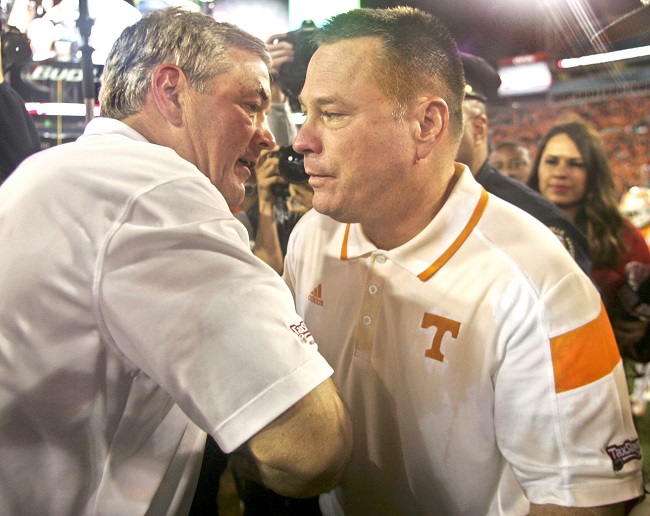
College football fans love to create narratives. We compile games, plays and moments in our heads to tell the stories of our favorite teams. We use those stories to foreshadow what might happen in the next chapter. But oftentimes, our favorite characters encounter struggles and predicaments we never saw coming.
There isn’t a better example to explain the plot twists of a college football season than the events that occurred after Tennessee’s 45-28 win over Iowa in the 2015 TaxSlayer Bowl.
Coming into that bowl game, the Volunteers had won four of their last five regular-season games while showing plenty of potential for one of the youngest teams in college football. But Tennessee’s fans wanted tangible proof that it’s program was heading in the right direction. They wanted Tennessee to win its first bowl game since its win over Wisconsin in the 2008 Outback Bowl.
But did the results carry over to this season?
The Vols overwhelmed Iowa on both sides of the ball. Iowa couldn’t match the speed that Tennessee showcased, and the Vols scored 28 points on their first four drives, building an insurmountable lead. Tennessee moved the ball at will against the 18th-ranked defense in the country and didn’t face a single third down until midway through the second quarter. Freshman RB Jalen Hurd gashed Iowa’s defense early and reached its second level with stunning regularity, finishing with 122 rushing yards and two TDs. QB Joshua Dobbs completed his first eight passes, ran for 76 yards and accounted for three total TDs.
The Vols looked like champions for the first time in years, but this victory seemed more about the future of Tennessee’s program rather than the present. One couldn’t watch the Vols’ victory without thinking that Tennessee was going to be a legitimate contender for the SEC’s Eastern Division title in 2015. And Tennessee coach Butch Jones’ comments after the game seemed to support this belief.
“We’ve learned how to win,” Jones said. “Our players expect to win now every time they step on the football field. In anything you do, that’s the starting process.”
Dobbs’ confidence also grew after Tennessee’s win over Iowa.
“This is the start of something big that’s going on at Tennessee,” Dobbs said. “It’s momentum that we can carry into the offseason. It’s the start of something big, a lot of momentum going into the offseason to get ready for next year.”
But during the beginning of the 2015 regular season, the supposed momentum the Vols had gained from their TaxSlayer Bowl victory didn’t lead to success. Tennessee suffered agonizingly close losses in three of its first five games and was practically out of the SEC title race before the midway point of the regular season.
After a 2-3 start to the season, Tennessee’s win over Iowa seemed long ago. And the script that many envisioned for Tennessee’s 2015 season was shredded into pieces.
Interestingly, the narrative of Tennessee’s 2015 season is fairly similar to that of its 2014 season. The Vols struggled through another front-loaded schedule, but finished the regular season on a five-game winning streak.
Now many believe another bowl win would be the perfect stepping stone to launch Tennessee into its 2016 season, already filled with high expectations. But when we look back at Tennessee’s win over Iowa, we realize that a bowl game result doesn’t foreshadow what will happen next season.
Instead, each season is its own separate narrative, with its own twists and turns. If you don’t think so, take a glance at what Iowa has done this season after gaining zero momentum from its loss in the TaxSlayer Bowl. As of now, the Hawkeyes just happen to be 12-0 and are only one win away from playing in the College Football Playoff.
Chase Erickson is a contributing writer for SDS. He covers Tennessee. Follow him on Twitter @ChaseDownField.







